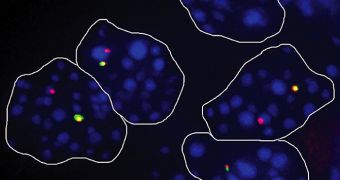A group of investigators from the Cold Spring Harbor Laboratory (CSHL), led by professor David Spector, has found in a new study a mechanism through which randomness and variability can appear in gene expression. What is even more interesting is that this particular phenomenon appears to occur more often in adult cells, as opposed to their stem precursors.
When a new embryo is formed, it contains gene copies, or alleles, from both parents, one from the mother, and another from the father. Usually, both of them get activated during development, a process that culminates with the synthesis of particular proteins.
As embryos develop into adults, both alleles are switched on or off, as needed. In the new study, scientists discovered that some cells activate only one of their two gene copies. This finding is critically important because it explains why protein yields are oftentimes altered in specific cells.
The process of only activating a single allele in a pair is called monoallelic gene expression. What the team discovered is that this process is more likely to occur in mature, fully-developed cells, rather than in their stem cell precursors. This may go a long way towards accounting for the variability and randomness that researchers often see in gene expression patterns.
The practical applications for this finding are staggering, especially when it comes to developing advanced diagnostics techniques. Some cells, for example, may become more prone to turning malignant if only half the amount of tumor-suppressing proteins is synthesized.
Monoallelic gene expression is a truly random process that “is not deterministic in any way. This significant amount of flexibility and randomness in gene expression is important for adaptation as a species evolves, but it is unclear how it functions in organisms today,” Spector explains.
The team was able to determine that monoallelic gene expression is 5.6 times more likely to occur in adult, fully-differentiated cells than in stem cells. Interestingly, some of these cells (around 8 percent) appeared capable of boosting their levels of protein production all on their own.
“This work raises many important questions, such as: how does the cell know how much of each protein to produce? How much flexibility is there? What is the tipping point toward disease?” Spector says.
The lead author of the new study was CSHL expert Mélanie Eckersley-Maslin, PhD. Researchers from the European Molecular Biology Laboratory (EMBL) were also a part of the team. The work is detailed in the February 24 online issue of the esteemed journal Developmental Cell.

 14 DAY TRIAL //
14 DAY TRIAL //